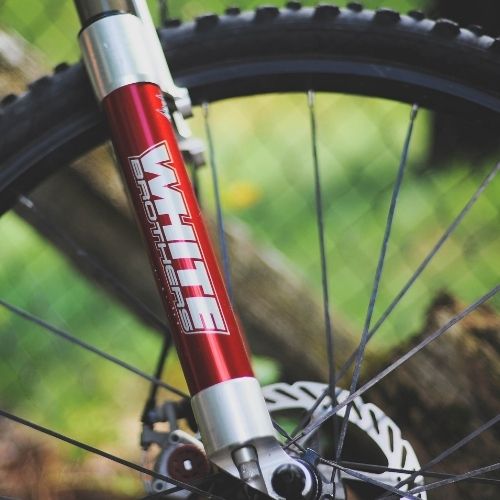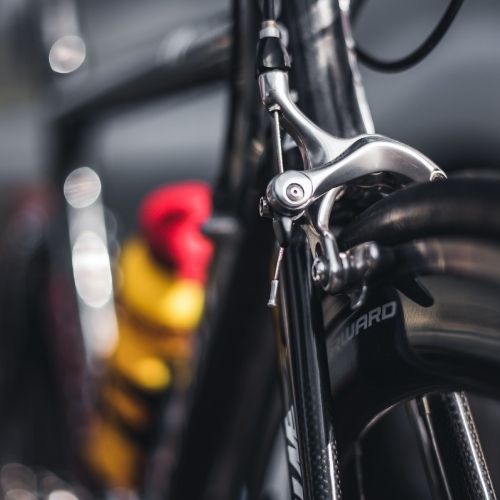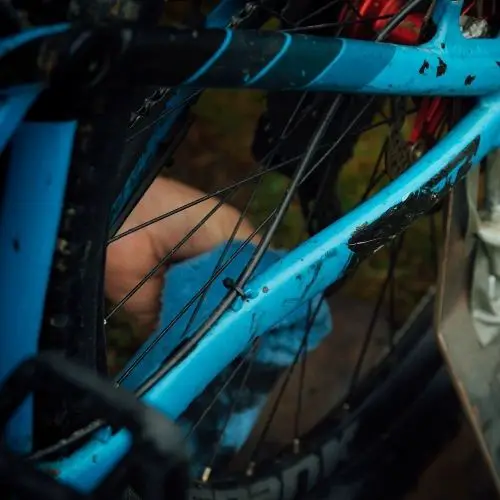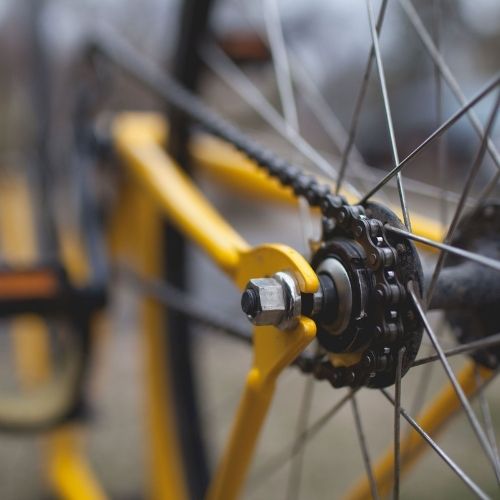Even if you are a total speed freak on a bike, you will need to slow down and stop at some point. The brakes on your bike are essential, and knowing the differences between the two main types is a vital element in choosing the right bike for you. In this post, we will go into the details of choosing disc brakes vs. rim brakes.
What Are The Differences Between Disc Brakes And Rim Brakes?
Rim Brakes
Rim brakes are what most people consider to be the type mounted on most bikes. They are straightforward but effective. When the rider pulls on the brake lever, the cable tension increases, making the caliper squeeze the brake pads onto the wheel’s rim. This causes friction on the wheel, slowing it down.
Disc Brakes
Instead of applying the pads to the rim, disc brakes squeeze a metal rotor attached to the wheel’s hub.
There are two types of disc brakes, mechanical and hydraulic. Mechanical disc brakes work in a similar way to rim brakes, as they use cable tension to actuate the calipers.
Hydraulic disc brakes use hydraulic fluid in a closed system. When the rider squeezes the levers, the fluid pushes the brake pads in the caliper onto the rotor, slowing down the wheel. This system is not unlike how a car’s braking system works.

Benefits Of Rim Brakes
Simple
Rim brakes are a tried and tested method of bringing a bike to a stop. The system hasn’t changed much over the years in the way it works. The innovations have all been in the quality of the levers, calipers, and pads.
Easy To Maintain
As rim brakes are so simple, they are easier to fix than more complicated systems.
Low Cost
The simplicity of rim brakes also means that they are less expensive to fit on to a bike. In addition to this, they are cheaper to repair.
Lightweight
The basic operation of rim brakes means that they have fewer parts. This makes them lightweight, which is why you will see them on road bikes, as roadies like to shave off grams wherever they can.
Disadvantages Of Rim Brakes
Less Stopping Power
Rim brakes don’t offer as much stopping power as disc brakes because of how they operate. However, they are much better than they used to be, and in most cases, they are more than adequate for most people’s needs.
Less Control
When you are riding down steep descents, you have more control when you can easily modulate your brakes. By feathering your brakes, you can control your speed without locking your wheels.
You can do this with rim brakes, but you can’t do it effectively as you can with disc brakes.
Not As Effective When Wet

When brake pads get wet, they lose some of their effectiveness. Over time, weather can corrode your rims, which results in tiny “pits” in your wheels. These pits reduce the surface area your brake pads have to work on, which reduces your stopping power.
Benefits Of Disc Brakes
More Stopping Power
There is no doubt that disc brakes give you more stopping power.
Better Modulation
The “feel” you get when using disc brakes (especially hydraulic ones) makes it easier to feather the brakes. This means you can gauge how much pressure you need to control your speed on steep descents much more easily.
Disc brakes reduce the likelihood of locking a wheel when you really don’t want to.
Better In Wet Weather
Disc brakes are way more reliable in soggy conditions than rim brakes. This is because the rotor is much smaller than the wheel’s rim. Therefore, the calipers squeeze harder, scraping, and burning off the water much more quickly.
Disc Brakes Don’t Wear Your Rims
Over time, rim brakes wear your rims, which can lead to blowouts. But this is not a problem you have with disc brakes. Rotors are much cheaper and easier to replace than a set of wheels. In addition to this, disc brakes are not affected by warped or slightly buckled wheels. This is a significant advantage if you buckle a wheel miles from home.
No Limit on Wheel Width
Wide wheels allow you to fit wide tires. These will give you more grip, especially when you are riding technical terrain on a mountain bike. Putting rim brakes on wide wheels can be tricky.
Other Reading
- Why Are My Bike Brakes Not Working?
- This Is When You Should Shift Gears On Your Bicycle
- What is a Bicycle Clutch?
Disadvantages of Disc Brakes
Higher Cost
Disc brakes have more parts to them, making them more complicated than rim brakes. Therefore, you have to expect disc brakes and bikes fitted with them to be more expensive. Hydraulic brakes are a bit more pricy to live with, too, as they need “bleeding” from time to time. Depending on which hydraulic brakes you have fitted to your bike, it is often easier to get a bike shop to do this for you.
Weight
This won’t bother too many mountain bikers unless they are hard-core cross country riders, but hydraulic disc brakes are heavier than rim brakes. This is because the components tend to be more robust, and the fluid adds extra weight.
Poor Aerodynamics
Again, not much of a worry for mountain bikers, but a roadie likes to be as slippery through the air as possible. Disc brakes increase drag on a bike, which could make a difference in a serious road race.
Disc Brakes Get Hot
With heavy braking, disc brakes generate lots of heat. This can affect the wheel hub and its bearings in extreme situations. Also, it is common for riders to burn themselves on hot rotors. This adds insult to injury when it happens during a crash!
They Squeal
Grit and dirt can build up and get on to your brake pads. This causes them to squeal loudly. Occasionally brakes will squeal if the calipers are not perfectly straight; therefore, it can take quite a lot of tinkering to stop them from making noise.
What Type Of Brakes Do You Need?
When it comes to disc brakes vs. rim brakes, you need to determine what type of riding (whether it be long rides, or shorter rides) you are going to be doing. You will have the option of choosing rim and disc brakes on pretty much any kind of bike. Here is what you need to know before buying a new bike when it comes to brake choice.
Commuter Bike
By a commuter bike, I am referring to a bike made for riding around the city in comfort. In most cases, rim brakes will be adequate enough to bring you safely to a stop. If you are riding in hilly areas, you may want to pay a bit more money for a bike with disc brakes.
If you are carrying lots of weight, disc brakes would be a wise choice to keep the extra weight under control.
Road Bike
Road bikes are generally fitted with rim brakes to save weight. You will find disc brakes fitted to more expensive road bikes that save weight in other areas. These bikes will likely feature carbon components where possible. If you are willing to pay extra money for ultimate stopping power, especially if you live in mountainous areas, disc brakes are a great idea. However, they are not essential. To prove this, all you need to do is look at bikes used in the Tour de France, as they currently use rim brakes.
Mountain Bike

If you are riding light off-road trails from time to time, rim brakes are adequate. But, when you start to ride more technical terrain with steeper descents, disc brakes are the way to go. The improved stopping power and modulation are invaluable to mountain bikers when taking on the rough stuff. Hydraulic disc brakes are the best choice, as they are safer and actually allow you to ride faster.
Electric Bikes
Most electric bikes come with disc brakes these days. This is because electric bikes are much heavier than traditional bikes and need extra stopping power to cope with the excess weight.
If you have an electric mountain bike, hydraulic disc brakes are the way to go without a doubt. But for an electric commuter bike, mechanical disc brakes should be adequate.
However, if you use your electric commuter bike to carry lots of weight or ride in hilly areas, you will find hydraulic brakes more beneficial.
Can You Upgrade Rim Brakes To Disc Brakes?
If you are thinking of upgrading your rim brakes for disc brakes, this is not really an option. This is because frames that are designed for disc brakes are different from those designed for rim brakes.
This is both in the way they are mounted and how the braking forces are applied to it. Therefore, if you want disc brakes, you really need to buy a new bike.
Final Thoughts
As you can see, there are many benefits to both disc brakes and rim brakes on a bike.
Disc brakes are generally better, but a set of quality rim brakes can be entirely sufficient depending on the type of riding you do.
But if you ride regularly in poor weather conditions, you will appreciate the benefits you get with disc brakes, no matter what bike you buy.
If you are a fair-weather rider that stays away from technical terrain and you want to keep the price down, rim brakes will be just fine.














